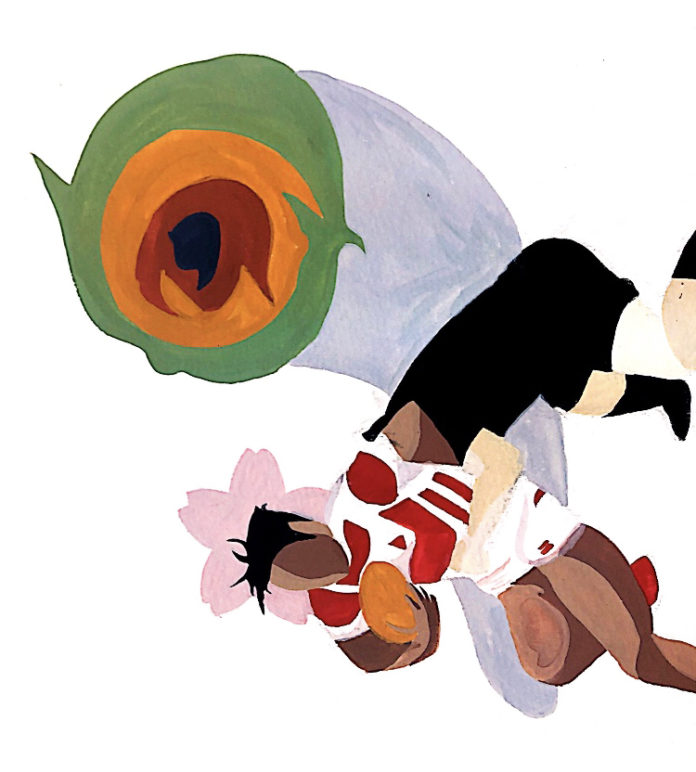Right in the middle of the 2019 Rugby World Cup, Typhoon Hagibis sent Japan into chaos. Due to damage from the storm, games between New Zealand and Italy, England and France, and Canada and Namibia were canceled. The tropical cyclone was the worst storm the country had experienced in 60 years. With a rising death toll of 74 and thousands more displaced, it would have been understandable to cancel the rest of the scheduled World Cup Games. But the Japanese team, The Brave Blossoms, was there to show their bravery in the face of disaster. Many, including the Scottish team, questioned if participating in the match would be appropriate during a time of devastation. However, the Japanese team used sports as a way to show dedication to their country, despite the extreme losses their fellow citizens experienced.
When warnings about the storm began to roll in early Oct. 10, many Japanese counties and prefectures began preparing for the potential damage. Local governments set designated evacuation centers at neighborhood schools, public service announcements advised residents to tape their windows to minimize damage from shattered glass and stores sold bottled water and portable phone chargers at an alarming rate. As the storm ramped up Oct. 11–12, everyone around the country made sure they were as sheltered as possible. Because of the damage and extreme flooding caused by Typhoon Hagibis, many of the World Cup matches during the week of Oct. 11–12 were canceled, and officials questioned the status of the post-storm games.
On the evening of Oct. 13, Japan played a challenging game against Scotland. Officials slept overnight at the Nissan Stadium in Yokohama, monitoring conditions to make the call whether or not to go ahead with the game. The rain had subsided by the morning and although there was still flooding, the stilt-raised stadium was unaffected. After much investigation and assessment of the surrounding areas, officials made the decision to play.
Many had questions regarding safety, including New Zealand coach Steve Hansen. While others were suffering and in need of help, they argued, rugby shouldn’t be the priority. Head of the Scottish Rugby Union, Mark Dodson, also disputed the decision, saying, “My view is that we are not going to let Scotland be the collateral damage for a decision that was taken in haste.” Dodson’s lack of consideration for the Japanese team, the World Cup and the rest of Japan was everything that is disgusting about sports — the over-aggressiveness and constant greediness for victory.
But the way the Brave Blossoms responded was everything that is right about sports — namely, it unified people who had nothing else in common. Despite all of this, their decision to play was made out of selflessness. The storm affected everyone in Japan. Whether they had to evacuate, grieve the loss of a family member or friend, deal with the loss of their home or witness the damage done to the homes of their loved ones — it took a toll on everyone. By choosing to play the game, they were choosing dedication to their country over everything else. They put aside all of the sadness and frustration and channeled it into the game.
Prior to playing Scotland, Japan beat Russia, Ireland and Samoa. During the 2015 Rugby World Cup, the team didn’t make it past the group rounds. Their game against Scotland was their chance for redemption. Win, and they move on to the quarter-finals. Lose, and they were out of the game.
On the evening of their game, I was at the Denver airport. I kept switching back and forth between reading updates on the storm and watching the game. Branches and trash were scattered all over the streets outside as the Brave Blossoms played on the TV. The crowd had carefully made their way through the flooded streets to the stadium, and the teams were preparing for the game. Before the game, there was a moment of silence for everyone affected by the storm, which was followed by the playing of the Japanese national anthem. Thousands of Japanese attendants sang louder than ever. The country was able to pause the devastation for just one second as the game ended with a score of 28–21. Japan was the winner — moving on to the quarter-finals and knocking Scotland out of the game.
Many wouldn’t have prioritized sports during this time, but it would have been the wrong decision to pull out. If Japan canceled the match, they would have lost out on the opportunity to show the world how strong they are, no matter the circumstances. Playing gave Japanese the positivity and strength needed to continue to fight and stay positive through all the damage. The Brave Blossoms proved their commitment to their country and showed us the power that sports have to unify people in the face of destruction. Since the game against Scotland, Japan played against South Africa Oct. 20 and lost 26–3. Although the loss knocked them out of the games, their win against Scotland in the midst of Typhoon Hagibis was the greatest victory of all.
Aime Fukada is a sophomore sociology major. She can be reached at afukada@oxy.edu.
![]()































